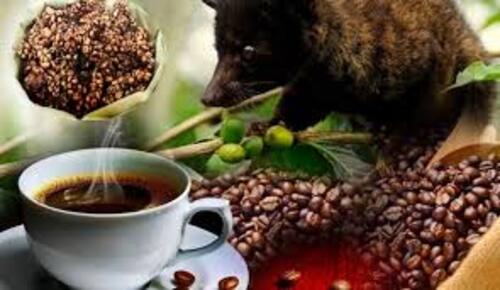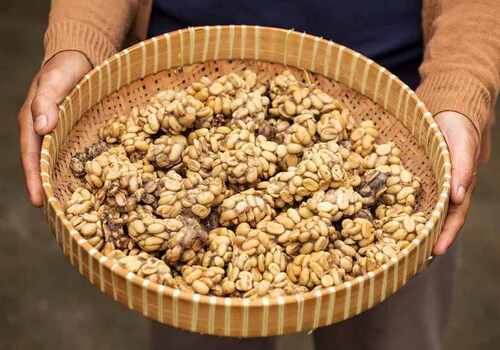Civet coffee, also known as Kopi Luwak, is one of the most unique and luxurious coffees in the world. Made from coffee beans that have been eaten by an animal, passed through its digestive system, and then excreted, this coffee has a fascinating and somewhat unusual production process. But how exactly did this discovery come about, and why has it captivated coffee enthusiasts globally? In this comprehensive article, we will explore the animal that eats coffee beans and poops them out, the history of Kopi Luwak, the science behind its unique flavor, and the ethical concerns surrounding its production.

The key player in the production of Kopi Luwak is the Asian palm civet (Paradoxurus hermaphroditus), a small, nocturnal mammal native to Southeast Asia. This creature plays a central role in the production of civet coffee by eating ripe coffee cherries and excreting the indigestible beans.
Natural Preference: Asian palm civets are naturally attracted to the ripe, sweet cherries of the coffee plant. They consume the cherries for their juicy pulp, but the beans themselves pass through the animal’s digestive system undigested.
Selective Eating: Civets are known for being selective eaters, often choosing only the ripest and best-quality coffee cherries. This preference contributes to the claim that Kopi Luwak is made from superior beans.
The civet’s digestive system then breaks down the outer layers of the cherry, exposing the beans to natural enzymes that change their chemical composition. Once excreted, the beans are collected, cleaned, and roasted, resulting in the famous Kopi Luwak.
The discovery of Kopi Luwak dates back to the early 18th century during Dutch colonial rule in Indonesia. The Dutch established coffee plantations across the islands of Java and Sumatra, but local Indonesian farmers were forbidden from harvesting coffee for their own use.
Dutch Coffee Restrictions: Under Dutch colonial regulations, local workers were not allowed to pick coffee beans for personal consumption. This led farmers to look for alternative ways to enjoy coffee.
Civets as a Solution: Farmers noticed that civets were eating the coffee cherries and excreting the beans. Out of necessity and curiosity, they began collecting the beans from the civet droppings, cleaning and roasting them to create coffee.
To their surprise, the coffee produced from these beans had a smoother and less bitter flavor. Over time, this unique coffee attracted the attention of Dutch colonists, who recognized its distinct taste and began to enjoy it themselves.
The civet’s digestive process plays a crucial role in creating the distinctive flavor of Kopi Luwak. When the beans pass through the civet’s stomach, they undergo fermentation and exposure to digestive enzymes, which change the coffee’s chemical composition.
Enzymatic Breakdown: The enzymes in the civet’s stomach break down proteins in the coffee beans, which reduces the bitterness and acidity often found in regular coffee.
Fermentation Process: The natural fermentation that occurs inside the civet further enhances the beans' flavor, contributing to the smoother and richer taste of Kopi Luwak.
Once excreted, the beans are collected, cleaned, and roasted like regular coffee, but the digestive process is believed to create a milder, more balanced coffee with earthy, nutty undertones.
Kopi Luwak is prized for its unique flavor, which differs from conventional coffee due to the natural processes it undergoes in the civet’s digestive system.
Smooth Texture: Kopi Luwak is known for its silky, smooth mouthfeel, with much lower acidity than regular coffee.
Earthy and Nutty Flavors: The fermentation within the civet’s digestive tract adds earthy and nutty flavors to the coffee, making it a rich and complex brew.
Reduced Bitterness: Thanks to the breakdown of proteins, the coffee has a more rounded, less bitter taste, which appeals to many coffee lovers.
While some coffee enthusiasts rave about the distinct flavor of Kopi Luwak, others argue that its rarity and exotic production process may contribute more to its appeal than the taste itself.
As Kopi Luwak gained popularity worldwide, ethical concerns arose regarding the treatment of civets and the environmental impact of coffee production.

Wild Civet Coffee: Initially, Kopi Luwak was made from beans collected from the droppings of wild civets. However, due to the growing demand for this rare coffee, many producers have shifted to farming civets in captivity.
Captive Civet Farming: In some farms, civets are kept in cages and force-fed coffee cherries, often leading to poor living conditions for the animals. This practice has raised significant concerns about animal welfare and the ethics of commercial civet coffee production.
Habitat Destruction: The demand for Kopi Luwak has also led to deforestation, as land is cleared to make way for coffee plantations. This not only threatens wild civet populations but also disrupts local ecosystems.
Sustainable Practices: Some producers have responded to these concerns by focusing on ethical and sustainable production methods, such as collecting beans from wild civets in their natural habitats.
For consumers concerned about the ethical implications of Kopi Luwak, it is important to seek out responsibly sourced and certified options that prioritize animal welfare and environmental sustainability.
One of the most notable aspects of Kopi Luwak is its price, which can range from $100 to $600 per pound. The high cost is due to several factors, including the labor-intensive collection process and the rarity of the beans.

Limited Supply: The production of Kopi Luwak is inherently limited by the reliance on civets to eat and excrete the beans, making it a rare commodity.
Labor-Intensive Processing: The process of collecting, cleaning, and roasting the beans after they’ve been excreted by civets is time-consuming and requires careful attention.
Luxury Appeal: Kopi Luwak has become a status symbol, often marketed as one of the most exclusive and luxurious coffees available. Its exotic production method adds to its allure for those seeking a rare coffee experience.
Kopi Luwak, or civet coffee, is one of the most intriguing and unique coffees in the world, known for its unusual production process involving the Asian palm civet. Discovered during Dutch colonial rule in Indonesia, this coffee has grown in popularity due to its smooth, rich flavor and the fascinating way it’s produced.
However, the rise of Kopi Luwak has also sparked ethical concerns regarding the treatment of civets and the environmental impact of coffee production. For those interested in trying this rare coffee, it’s important to seek out ethically sourced options to ensure that both animal welfare and sustainability are prioritized.
Despite the controversy, Kopi Luwak remains a symbol of luxury and exclusivity in the coffee world, offering a truly unique experience for those who seek to taste the result of one of nature’s most curious processes.
animal tags: civet-coffee Kopi-Luwak
We created this article in conjunction with AI technology, then made sure it was fact-checked and edited by a Animals Top editor.